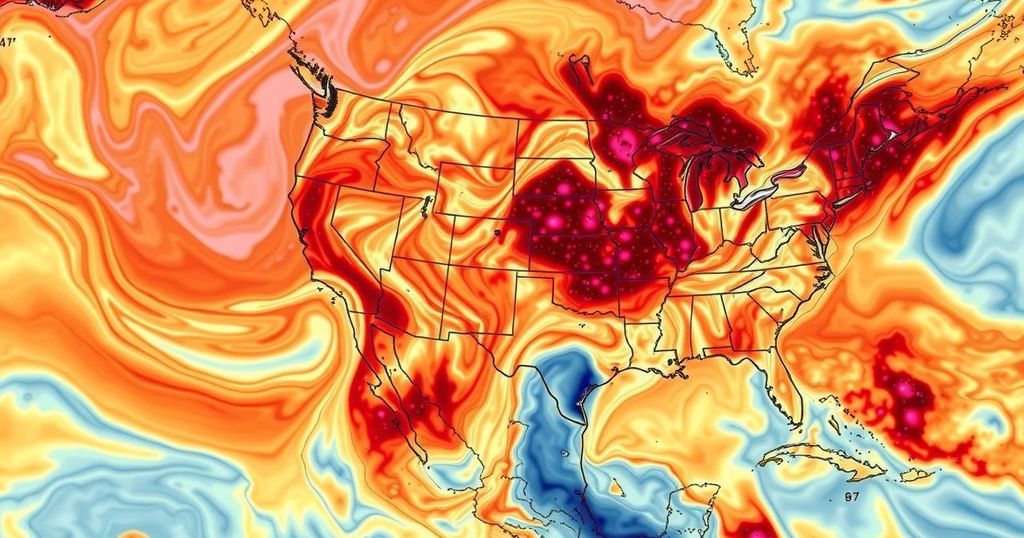2024 Sees 41 Days of Dangerous Heat Due to Climate Change, Experts Warn

In 2024, climate change has led to an additional average of 41 days of dangerous heat worldwide, contributing to over 3,700 deaths and displacing millions. Extreme weather events are intensifying, driven by fossil fuel use, necessitating urgent global action for climate adaptation and mitigation.
In 2024, global heat levels have escalated dangerously due to climate change, resulting in an average increase of 41 additional days characterized as dangerously hot. A report by World Weather Attribution (WWA) and Climate Central reveals that extreme weather events, exacerbated by human-induced climate change, have led to over 3,700 fatalities and displaced millions this year. This alarming trend calls for urgent actions to transition away from fossil fuels and enhance preparations for inevitable severe weather in the future.
This year, the prevalence of extreme weather drastically exemplifies the severe repercussions of fossil fuel emissions. Dr. Friederike Otto, a lead researcher at WWA, indicated that, “This year has been the clearest and most devastating demonstration of the impacts of fossil fuel warming.” The study examined 219 extreme weather events, noting that climate change intensified 26 of the 29 scrutinized incidents, including catastrophic floods, hurricanes, and droughts, with devastating consequences.
Among the significant ongoing crises highlighted, extreme rainfall in regions like Kerala and deadly floods in Africa accounted for a considerable loss of life and displacement. The report emphasized that a shifting climate is likely to yield annual occurrences of such extreme events if warming trends continue. Notably, Hurricane Helene’s impact was significantly intensified due to warmer sea temperatures, making it 200 to 500 times more probable because of climate change, resulting in 230 fatalities.
Africa faces a particularly grim reality, disproportionately impacted by climate change despite its minimal contributions to global emissions. Joyce Kimutai, a research associate at the Centre for Environmental Policy, asserted that, “Africa continues to bear the brunt of climate change despite contributing the least emissions.” Calls for rich nations to fulfill climate finance obligations in 2025 reflect a need for support for affected regions, which are particularly vulnerable.
The additional days of dangerous heat, classified as temperatures exceeding the historic top 10% from 1991 to 2020, pose significant public health risks worldwide. Joseph Giguere from Climate Central remarked that, “Almost everywhere on Earth, daily temperatures hot enough to threaten human health have become more common due to climate change.” Without decisive action to mitigate fossil fuel use, these dangerous heat days are expected to increase.
The report advocates for four crucial resolutions for 2025: a swift transition to renewable energy, enhanced early-warning systems for extreme weather, real-time monitoring of heat-related fatalities, and increased international financial support for climate adaptation in developing countries. Dr. Otto expressed optimism, stating, “We have the knowledge and technology to replace fossil fuels with renewable energy and halt deforestation. The solutions have been in front of us for years.”
As 2024 approaches record-breaking heat levels, this report underscores the urgent need for cooperative global action to confront the escalating climate crisis and minimize future catastrophes.
The article addresses the growing urgency of climate change impacts observed in 2024, specifically highlighting the increase in extreme heat days globally. It relies on findings from a comprehensive report by reputable climate institutions, which illustrates the severe consequences of human-induced climate change, including heightened mortality rates, displacement of populations, and an array of extreme weather phenomena. This context sets the stage for understanding the urgency for action against climate change.
The report from World Weather Attribution and Climate Central paints a dire picture of the current climate emergency, illustrating how human actions have drastically increased extreme weather events, leading to significant human and environmental costs. The necessity for immediate, collective action towards renewable energy and other mitigation strategies is emphasized, as failure to act will lead to increasingly severe public health threats and environmental consequences.
Original Source: www.dynamitenews.com






